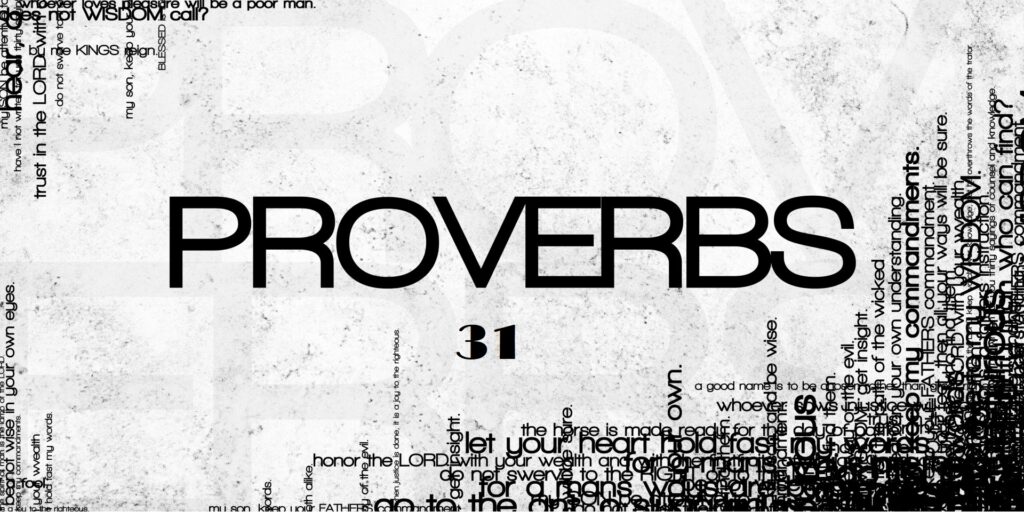In a world constantly searching for authentic leadership and meaningful purpose, Proverbs 31 stands as one of the most profound and practical chapters in all of Scripture. This remarkable passage offers a complete framework for living with wisdom, integrity, and excellence that transcends cultural boundaries and historical periods.
Proverbs 31 uniquely combines royal mother’s teachings with the celebrated portrait of the Wife of Noble Character, creating a comprehensive guide for leadership, family responsibility, and personal development. Unlike many ancient texts that have lost their relevance, the Proverbs 31 woman continues to inspire millions worldwide, offering timeless principles for success in every area of life.
The chapter’s enduring appeal lies in its practical wisdom that addresses universal human experiences: work, relationships, justice, financial stewardship, and spiritual growth. Whether you’re studying Proverbs 31 KJV, Proverbs 31 NIV, or Proverbs 31 NKJV, the core message remains powerfully consistent across translations.
This Proverbs 31 explanation will explore both sections of the chapter, examining the Sayings of King Lemuel and the detailed portrait of feminine excellence that has shaped countless lives throughout history.
The Sayings of King Lemuel: A Mother’s Counsel to Her Son
The Identity and Mystery of King Lemuel
The opening verses of Proverbs 31 introduce us to King Lemuel and his mother’s profound oracle. Biblical scholars have long debated Lemuel’s identity, with some suggesting he may be Solomon himself, writing under a different name, while others propose he was a distinct ruler in ancient Arabia or Edom.
What remains undisputed is the significance of maternal instruction in ancient royal courts. In ancient Near Eastern cultures, royal mothers held positions of tremendous influence, often serving as advisors and wisdom teachers to their sons. This mother wasn’t merely offering personal advice—she was delivering an oracle, a prophetic teaching that carried divine authority.
The literary structure of these sayings follows the traditional format of royal instruction, similar to other ancient wisdom texts like the Instructions of Amenemhope from Egypt or the Words of Ahiqar from Mesopotamia. However, the content distinctly reflects Hebrew wisdom traditions and theological foundations.
Warning Against Destructive Behaviors
Proverbs 31:3 delivers a stark warning: “Do not give your strength to women or your ways to those who destroy kings.” This verse addresses the critical connection between personal character and public responsibility.
The Hebrew word for strength (chayil) encompasses physical power, wealth, and vital energy. The mother’s counsel warns against dissipating these resources through inappropriate relationships that compromise leadership effectiveness. History provides numerous examples of leaders whose personal indiscretions led to political downfall, from King David’s affair with Bathsheba to more recent political scandals.
Proverbs 31:4-7 continues with warnings about alcohol abuse: “It is not for kings to drink wine, not for rulers to crave beer, lest they drink and forget what has been decreed, and deprive all the oppressed of their rights.”
This passage doesn’t advocate total abstinence but warns against alcohol’s potential to cloud judgment and compromise justice. The connection between substance abuse and neglect of the oppressed reveals the broader social consequences of leadership failures.
| Leadership Warning | Consequence | Modern Application |
|---|---|---|
| Sexual misconduct | Loss of credibility | Personal integrity affects professional effectiveness |
| Substance abuse | Impaired judgment | Clear thinking required for wise decisions |
| Neglect of justice | Social harm | Leaders must protect vulnerable populations |
The Call to Justice and Advocacy
Proverbs 31:8-9 transitions from warnings to positive commands: “Speak up for those who cannot speak for themselves, for the rights of all who are destitute. Speak up and judge fairly; defend the rights of the poor and needy.”
This mandate for justice reflects core biblical theology that views advocacy for the marginalized as a divine imperative. The Hebrew concept of justice (mishpat) encompasses not merely legal proceedings but active intervention on behalf of those lacking power or voice.
The repeated command to “speak up” emphasizes the proactive nature of true leadership. Effective leaders don’t wait for problems to escalate—they identify injustice early and intervene decisively. This principle applies equally to corporate leadership, community involvement, and family responsibility.
The Wife of Noble Character: A Portrait of Comprehensive Virtue
Literary Analysis and Structure
Proverbs 31:10-31 presents the famous portrait of the Wife of Noble Character through a sophisticated Hebrew acrostic poem. Each verse begins with successive letters of the Hebrew alphabet, creating a comprehensive A-to-Z guide for excellent living.
This literary device wasn’t merely decorative—it served as a memory aid in an oral culture while symbolizing completeness. The acrostic structure suggests that the virtuous woman embodies excellence from “aleph to tav” (A to Z), representing total life integration.
The Hebrew term “eshet chayil” (woman of valor/strength) appears only a few times in Scripture, notably describing Ruth (Ruth 3:11) and the ideal woman in Proverbs 31:10. This same word (chayil) describes warriors, emphasizing that this woman possesses warrior-like strength and courage in facing life’s challenges.
Character Qualities and Virtues
Trustworthiness and Reliability
Proverbs 31:11 establishes the foundation: “Her husband has full confidence in her and lacks nothing of value.” The Hebrew word for confidence (batach) implies complete security and trust. This isn’t passive trust but active confidence based on proven reliability.
Trust forms the bedrock of all meaningful relationships, whether in marriage, business partnerships, or friendships. The Proverbs 31 woman characteristics begin with this fundamental quality because without trust, all other virtues become meaningless.
Initiative and Industriousness
Proverbs 31:13 reveals: “She selects wool and flax and works with eager hands.” The phrase “eager hands” translates from Hebrew suggesting delight and enthusiasm in work. This woman doesn’t approach tasks grudgingly but finds joy in productive activity.
Proverbs 31:19 adds: “In her hand she holds the distaff and grasps the spindle with her fingers.” This detailed description of textile work emphasizes skilled craftsmanship and attention to quality. The Proverbs 31 woman doesn’t just complete tasks—she excels in her endeavors.
Proverbs 31:24 describes her business acumen: “She makes linen garments and sells them, and supplies the merchants with sashes.” This verse reveals entrepreneurial skills and commercial engagement, challenging any notion that excellence means withdrawal from economic participation.
Wisdom and Prudence
Proverbs 31:16 showcases strategic thinking: “She considers a field and buys it; out of her earnings she plants a vineyard.” The Hebrew word for “considers” implies careful evaluation and due diligence. She doesn’t make impulsive decisions but thoughtfully analyzes opportunities.
This verse also reveals financial independence and investment wisdom. She uses her earnings strategically, understanding long-term wealth building through real estate and agricultural investments. Her vineyard represents both immediate provision and future financial security.
Compassion and Generosity
Proverbs 31:20 declares: “She opens her arms to the poor and extends her hands to the needy.” Despite her business success and household responsibilities, she maintains deep concern for society’s marginalized members.
The parallel structure (“opens her arms” / “extends her hands”) emphasizes both emotional availability and practical assistance. True excellence involves both personal success and social responsibility.
Strength and Dignity
Proverbs 31:25 provides one of the most quoted verses: “She is clothed with strength and dignity; she can laugh at the days to come.” The Hebrew word for strength (oz) denotes both physical power and inner fortitude.
The phrase “clothed with strength and dignity” suggests these qualities are as essential as physical garments—they’re not optional accessories but necessary elements of daily life. Her confidence about the future stems from present preparation and character development.
Wisdom in Speech
Proverbs 31:26 reveals: “She speaks with wisdom, and faithful instruction is on her tongue.” The Hebrew word for faithful (chesed) implies covenant loyalty and loving-kindness.
Her speech combines wisdom (practical knowledge) with faithful instruction (covenant loyalty). She doesn’t use words carelessly but speaks purposefully to build up others and share valuable insights.
Roles and Responsibilities Explored
Economic Participation
The Proverbs 31 woman engages extensively in economic activities:
- Textile production (Proverbs 31:13, 19, 22)
- International trade (Proverbs 31:14)
- Real estate investment (Proverbs 31:16)
- Agricultural development (Proverbs 31:16)
- Manufacturing and retail (Proverbs 31:24)
This comprehensive economic engagement challenges any interpretation that limits women to purely domestic roles. She operates as entrepreneur, investor, manufacturer, and trader while maintaining household excellence.
Household Management
Her domestic skills receive equal attention:
- Food procurement and preparation (Proverbs 31:14-15)
- Clothing production (Proverbs 31:21-22)
- Servant supervision (Proverbs 31:15)
- Family provision (Proverbs 31:21, 27)
The Proverbs 31 woman doesn’t choose between career success and family excellence—she pursues both with equal diligence and skill.
Community Involvement
Proverbs 31:20 specifically mentions her charitable activities, while verse 31 suggests broader community recognition. She balances personal success with social responsibility, understanding that true excellence contributes to community welfare.
Theological and Spiritual Dimensions
The Fear of the Lord as Foundation
Proverbs 31:30 provides the theological climax: “Charm is deceptive, and beauty is fleeting; but a woman who fears the Lord is to be praised.” This verse establishes that all the previously described qualities find their source in proper relationship with God.
The “fear of the Lord” represents reverential awe and obedience that forms the foundation of biblical wisdom (Proverbs 1:7). Without this spiritual foundation, all other achievements become ultimately meaningless.
The contrast between temporary attractions (charm, beauty) and eternal character reveals the Proverbs 31 meaning: sustainable excellence requires spiritual depth that transcends superficial qualities.
Divine Blessing and Human Effort
The Proverbs 31 woman demonstrates the biblical balance between divine blessing and human responsibility. Her success results from both God’s favor and her consistent diligence. This partnership model appears throughout Scripture, emphasizing that spiritual faith enhances rather than replaces practical effort.
Proverbs 31:31 concludes: “Honor her for all that her hands have done, and let her works bring her praise in the city gates.” Her recognition comes through demonstrated accomplishment, not merely good intentions or spiritual claims.
Integration with Broader Biblical Themes
The Proverbs 31 woman connects with several biblical themes:
- Wisdom literature parallels with Proverbs 8’s personification of wisdom as feminine
- Covenant faithfulness reflected in her loyal character
- Creation mandate to be fruitful, multiply, and exercise dominion
- Kingdom principles of serving others and stewarding resources
Practical Applications for Modern Life
For Individuals (All Genders and Life Stages)
The Proverbs 31 woman characteristics provide universal principles:
Character Development:
- Build trustworthiness through consistent reliability
- Approach work with enthusiasm and excellence
- Develop strategic thinking and planning skills
- Balance personal success with social responsibility
- Cultivate wisdom in speech and relationships
Financial Stewardship:
- Practice careful evaluation before major purchases
- Invest in assets that provide long-term value
- Develop multiple income streams through skills development
- Maintain generous attitudes toward those in need
- Build wealth through patience and diligence
Relationship Building:
- Provide emotional security through trustworthy behavior
- Communicate with wisdom and loving-kindness
- Support others’ success while pursuing personal goals
- Balance individual achievement with family responsibility
- Engage actively in community improvement
For Families
Parenting Principles:
- Model diligence and excellence in daily activities
- Teach children practical skills alongside character development
- Demonstrate balance between work and family priorities
- Show children how to serve others while pursuing personal goals
- Integrate spiritual values with practical wisdom
Marriage Partnership:
- Build marriages on trust and mutual respect
- Support spouse’s goals while maintaining individual identity
- Share household and financial responsibilities equitably
- Communicate openly about decisions and planning
- Model servant leadership for children
Household Management:
- Organize systems that support family goals
- Teach children responsibility through age-appropriate tasks
- Create environments that welcome others
- Manage resources wisely for present needs and future security
- Establish routines that support both productivity and relationships
For Leaders and Professionals
Ethical Leadership:
- Lead with integrity in all professional relationships
- Speak up for those lacking voice or power
- Make decisions based on careful analysis and wisdom
- Balance profit motives with social responsibility
- Develop others while pursuing organizational goals
Excellence Standards:
- Pursue quality in all professional endeavors
- Develop expertise through continuous learning
- Build reputation through consistent reliability
- Innovation balanced with proven principles
- Long-term thinking that considers broader impact
Mentorship:
- Share wisdom and practical skills with others
- Model integration of faith and work
- Support others’ success without competition
- Provide guidance for both professional and personal development
- Create opportunities for others to develop leadership skills
Contemporary Relevance and Challenges
Addressing Modern Tensions
Work-Life Integration: Modern professionals face unprecedented challenges balancing career demands with family responsibilities. The Proverbs 31 woman offers a model of integration rather than compartmentalization. She doesn’t separate her roles but sees them as interconnected aspects of comprehensive excellence.
Key principles for modern application:
- Prioritize based on values rather than external pressures
- Develop systems that support multiple responsibilities
- Seek opportunities where different roles can complement each other
- Build support networks that enable sustainable excellence
- Remember that seasons of life may require different emphases
Gender Role Evolution: Contemporary discussions about gender roles can obscure the Proverbs 31 message. The passage presents principles of excellence that transcend gender-specific applications. Both men and women can learn from this model of integrity, diligence, wisdom, and social responsibility.
The traits of a Proverbs 31 woman include:
| Character Trait | Modern Application | Universal Principle |
|---|---|---|
| Trustworthiness | Reliable in commitments | Integrity builds all relationships |
| Diligence | Excellence in work | Quality effort produces quality results |
| Wisdom | Strategic thinking | Good decisions require careful consideration |
| Generosity | Social responsibility | Success includes serving others |
| Strength | Resilience under pressure | Character develops through challenges |
Economic Participation: The Proverbs 31 woman’s extensive business activities provide strong biblical support for women’s full economic participation. She engages in manufacturing, trade, investment, and entrepreneurship while maintaining family excellence.
Modern applications include:
- Developing marketable skills and expertise
- Building financial independence and security
- Contributing to household income and stability
- Using economic success to benefit others
- Modeling diligence and excellence for children
Technology Impact: While technology offers unprecedented opportunities, it also creates new challenges for maintaining personal relationships and family connection. The Proverbs 31 model emphasizes direct, personal engagement that builds trust and serves others effectively.
Principles for the digital age:
- Use technology to enhance rather than replace personal relationships
- Maintain face-to-face communication for important matters
- Balance online activity with physical presence in community
- Leverage technology for learning and skill development
- Protect family time from digital distractions
Cross-Cultural Applications
The Proverbs 31 principles transcend cultural boundaries while respecting different expressions of the same virtues. Whether studying Proverbs 31 ESV, Proverbs 31 New International Version, or Proverbs 31 New King James versions, the core values remain consistent.
Universal Principles:
- Excellence in chosen endeavors
- Integrity in all relationships
- Wisdom in decision-making
- Compassion for those in need
- Strength in facing challenges
- Faithfulness to commitments
Cultural Sensitivity: Different cultures may express these principles through varying customs and practices. The key is identifying the underlying values rather than imposing specific cultural expressions.
For example:
- Economic participation may take different forms across cultures
- Family structures vary while maintaining core responsibilities
- Community involvement adapts to local needs and opportunities
- Spiritual expression reflects diverse religious traditions
- Leadership styles adjust to cultural communication patterns
Living the Legacy: Practical Steps Forward
Personal Reflection Questions
Understanding what is a Proverbs 31 woman begins with honest self-assessment:
- Trust and Reliability: Do others find me consistently trustworthy in both small and large matters?
- Work Excellence: Do I approach my responsibilities with enthusiasm and pursue quality results?
- Wisdom and Planning: Do I make decisions carefully, considering long-term consequences?
- Generosity and Service: Am I actively involved in helping others and contributing to community welfare?
- Character Development: Am I growing in strength, dignity, and wisdom over time?
- Spiritual Foundation: Is my relationship with God the source of my motivation and values?
Actionable Steps for Growth
How to be a Proverbs 31 woman involves practical development:
Week 1-2: Trust Building
- Identify areas where reliability needs improvement
- Make and keep small commitments to build credibility
- Communicate clearly about expectations and timelines
- Follow through on promises, however small
Week 3-4: Excellence Development
- Choose one area of responsibility for quality improvement
- Develop new skills related to current roles
- Seek feedback from others about performance
- Celebrate progress while identifying next steps
Week 5-6: Wisdom Cultivation
- Practice careful decision-making processes
- Seek advice from wise mentors or advisors
- Study successful models in areas of interest
- Reflect on lessons learned from recent experiences
Week 7-8: Service Integration
- Identify specific needs in your community
- Volunteer time or resources to help others
- Look for ways to speak up for those needing advocacy
- Balance service with other responsibilities
Week 9-10: Strength Building
- Develop physical health and energy
- Build emotional resilience through challenges
- Cultivate mental strength through learning
- Strengthen spiritual foundation through faith practices
The Continuing Journey
The Proverbs 31 woman represents not a destination but a journey of continuous growth and development. Her lamp does not go out at night (Proverbs 31:18), symbolizing ongoing diligence and attention to responsibility.
Modern readers can find encouragement in several key truths:
Excellence is Progressive: The Proverbs 31 woman didn’t achieve everything overnight. Her reputation developed through consistent faithfulness over time.
Integration is Possible: She successfully balanced multiple roles without sacrificing quality in any area. This encourages modern people facing similar challenges.
Character Matters Most: Her lasting legacy came from who she was more than what she accomplished. Character development remains the foundation for all other achievements.
Impact Extends Beyond Self: Her influence blessed her family, community, and future generations. Excellence creates positive ripple effects that extend far beyond individual achievement.
Conclusion: The Eternal Value of Wisdom
Proverbs 31 continues to inspire because it addresses the deepest human longings for purpose, excellence, and meaningful contribution. The Wife of Noble Character shows us that it’s possible to live with integrity, pursue excellence, serve others, and maintain faith in an integrated, sustainable way.
Whether you’re seeking Proverbs 31 devotions or Proverbs 31 daily encouragement, remember that this passage offers more than inspiration—it provides a practical blueprint for excellent living. The meaning of Proverbs 31 centers on the truth that lasting success requires both human effort and divine wisdom, both personal achievement and social responsibility.
The woman described in Proverbs 31:10-31 achieved something remarkable: she created a life of significance that blessed everyone around her while finding personal fulfillment and recognition. Her example proves that excellence doesn’t require choosing between success and service, achievement and character, work and family.
In our contemporary world filled with conflicting pressures and competing demands, the Proverbs 31 woman offers hope that integration is possible. We can pursue excellence in our chosen fields while maintaining strong relationships. We can achieve financial success while serving those in need. We can develop our talents while building character that honors God.
The lamp that burns through the night in Proverbs 31:18 symbolizes the ongoing nature of this commitment. Excellence isn’t achieved through occasional bursts of effort but through consistent faithfulness in daily choices and responsibilities.
As we face our own challenges and opportunities, may we draw inspiration from this timeless portrait of wisdom, strength, and dignity in action. The Proverbs 31 legacy continues through each person who chooses to live with integrity, serve with compassion, work with excellence, and love with faithfulness.
Her children rise up and call her blessed, her husband praises her, and her community honors her—not because she was perfect, but because she was faithful. In the end, that may be the most encouraging truth of all: the Proverbs 31 woman achieved greatness not through perfection but through consistent character and unwavering commitment to wisdom.
“Give her the reward she has earned, and let her works bring her praise at the city gate” (Proverbs 31:31). This is both the promise and the challenge of Proverbs 31—that lives lived with wisdom, integrity, and love will ultimately receive the recognition and reward they deserve.

Catherine Frank, founder of BiblicalHorizon.com, shares daily prayers and Bible verses to nurture spiritual growth. With a lifelong passion for scripture and prayer traditions, she creates accessible spiritual content that resonates with both seasoned believers and newcomers seeking divine connection.



